Research Laboratories
Psychological science faculty members have laboratories that conduct research across a wide range of specialties in our Department. Many of these labs employ graduate and undergraduate students, giving them hands-on research training.
To inquire about becoming a research assistant in a faculty lab, please contact the lab’s PI.
Behavioral Neuroscience
Our concentrations in behavioral neuroscience and neuroscience offer a wide variety of approaches and methods for studying the relationship between the nervous system and behavior. Behavioral neuroscience emphasizes electrophysiological, genetic, pharmacological, and neurochemical analyses of sensory, motor, motivational, and cognitive processes organized by the forebrain, along with animal models of neuropsychiatric disorders.
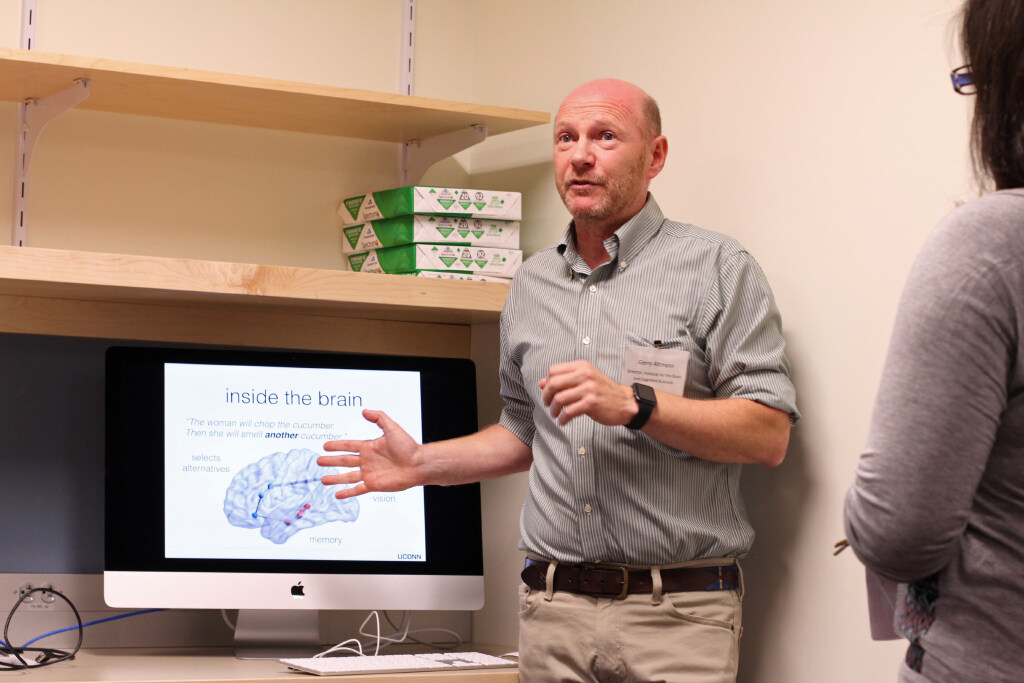
Fitch Lab
PI: Roslyn Fitch
Research the Fitch Lab is focused on the study of behavioral consequences of injury or disruption of typical developmental processes in the young brain. To address this topic, we employ various rodent models of developmental brain injury/disruption and other genetic disorders, and then follow subjects as they develop by studying their behavioral and cognitive abilities.
Human Behavioral Science Lab
PI: Robert S. Astur
The goal of the Human Behavioral Science Lab is to use behavioral neuroscience theory and methodology in human populations to help elucidate the neural bases of memory function. This translational approach takes advantage of the rich paradigms that have been extensively developed for testing nonhumans and extends them to human clinical psychology research.
We use a wide variety of methods to assess behavior in humans, including virtual reality environments such as a virtual Morris water task, a virtual radial-arm maze, and virtual place preference chambers. Furthermore, we use basic learning and memory paradigms such as fear conditioning and mental rotation tasks. Our primary data collection methods include behavioral data, functional magnetic resonance imaging (fMRI), diffusion tensor imaging (DTI), event-related potentials (ERP), galvanic skin response (GSR), and cardiac responses (ECG). We collect these data from a variety of individuals with and without psychiatric illness, including health controls, schizophrenia, substance abuse, Alzheimer’s disease, posttraumatic stress disorder, and eating disorders. Additionally, we also examine the effects of a variety of drugs such as alcohol, marijuana, nicotine, amphetamine, and cocaine on memory function.
Markus Lab
PI: Etan Markus
The Markus Lab at the University of Connecticut works with rat populations to study aging, memory encoding, neural network representation, and competition between brain systems. We are interested in understanding how an experience gets "turned into" a memory. Our lab focuses on how networks of neurons process and represent information. Clinical findings in humans show that the hippocampus and related structures are crucial for encoding the "what, when, and where" of an experience and forming long-lasting memories. Similar results are seen in rats. We test rats on a variety of memory tasks together with an examination of the activity of the neurons in their hippocampus.
Sensory Perception and Neuroscience Lab
PI: Heather Read
Mammals perceive sound's frequency, shape and rhythm and use these cues to react to social communications and other natural sounds. In humans, these capabilities are diminished in a variety of cortical developmental disorders including specific language impairment, dyslexia and autism. In the Read Lab, we examine the neurobiology of sound perception at the single neuron, neural network and behavioral levels. In addition to developing comprehensive theories for how biological systems perceive sounds including social communications, we aim to develop new strategies for speech recognition, prosthetic hearing devices, and diagnostic tools for identifying central auditory processing disorders.
Statistical Neuroscience Lab
PI: Ian Stevenson
A central challenge in neuroscience is understanding how information is represented and processed in the brain. In the UConn Statistical Neuroscience Lab we address this challenge by developing computational tools to describe and decipher neural activity. Our work focuses on 1) modeling neural dynamics, interactions, and adaptation and 2) linking neural data with perception, behavior, and learning.
Clinical Psychology
Clinical psychology trains students to conduct empirical research on the causes, assessment, and treatment of mental health conditions and to deliver evidence-based services that promote wellbeing across the lifespan.
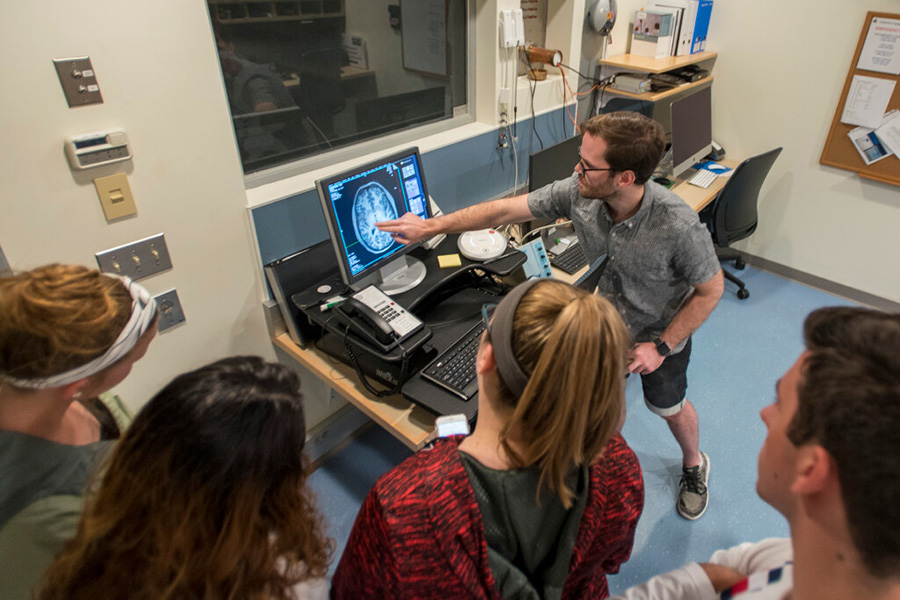
Child and Adolescent Anxiety Lab
Research in the Child and Adolescent Anxiety Lab focuses on the nature of anxiety with a focus on cognitive and environmental risk factors for children through emerging adults. As scientists, we are interested in the interplay between cognitive vulnerability and peer/parental interaction patterns as they contribute to or maintain anxiety. As clinicians, we are motivated to understand the application of these factors to the treatment of anxiety disorders.
Connecticut Autism and Language Lab
Research in the Connecticut Autism and Language Lab (CALL) addresses a fundamental challenge in autism spectrum disorder (ASD): how to map complex behavioral constructs, such as social communication deficits, onto mechanistic processes in the brain. The aim is to better understand the pathology of ASD by linking research at the molecular level (genetics), at the neurofunctional level (brain imaging), and at the behavioral level (symptomatology).
EMPOWER Lab
PI: Amy Egbert
Research in the EMPOWER Lab EMPOWER Lab focuses on understanding disordered eating in youth from underrepresented backgrounds. We want to understand why kids eat the way they eat, and to treat disordered eating in a culturally responsive and effective way. To do so, we use a variety of methods, including qualitative interviews, real-time assessment through smartphone app, and partnerships with medical providers. Historically, youth from racial and ethnic minority backgrounds have been left out of the research process. As a result, their voices have not been heard. Our research is focused on changing that.
Milan Intergenerational Risk Lab
PI: Stephanie Milan
Individuals who grow up experiencing maltreatment, violence, and trauma often have difficulties that last into adulthood, including in parenting their own children. The Milan Intergenerational Risk Lab focuses on identifying mechanisms that account for intergenerational cycles of risk, particularly those amenable to intervention.
Spirituality, Meaning and Health Lab
PI: Crystal Park
The first hour of the Spirituality, Meaning and Health Lab consists of a discussion among graduate and undergraduate students, usually a journal club discussing a recent research article. Many of our undergraduates become integral team members and assist the research progress in many critical ways. Undergraduates are frequently authors of papers and chapters published from the studies in our lab. The second hour of lab, Grad Lab, is just for Dr. Park and the graduate students. In this meeting, we discuss and brainstorm about nascent research ideas, current difficulties or issues in our work, or ongoing manuscripts.
Developmental Psychology
Developmental psychology takes an integrative approach to the study of development from infancy to early adulthood. It investigates growth and transformation across multiple domains (cognitive, language, social, emotional), embraces a variety of theoretical perspectives, utilizes a wide range of methodologies, and crosses multiple levels of analysis.
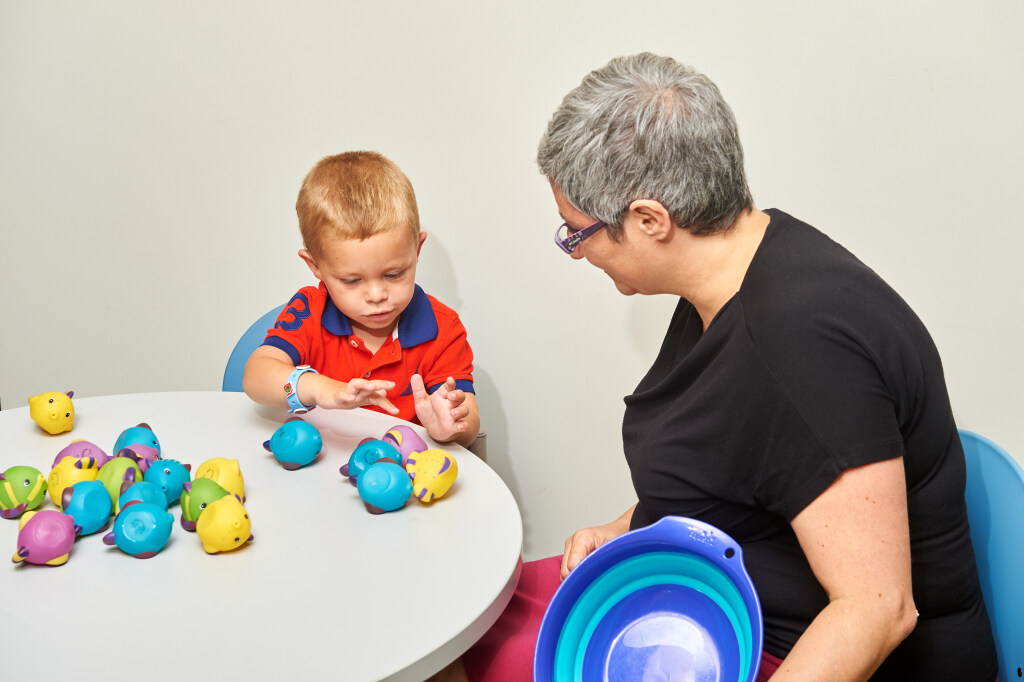
Child Language Lab
PI: Letitia Naigles
But just how do children use their environmental input? And just what are those abilities and precursors to language learning? This is what we are studying at the UConn Child Language Lab. We study how kids develop in both speaking and understanding, but our focus is on language comprehension because early on, kids really seem to understand more than they can say, and we want to give the kids every possible way to show what they know. And as you look through the projects we’re involved in, you’ll see that very young children really understand a lot about language!
Cognition, Action, and Psychophysiology Lab (CAP Lab)
PI: Kimberly Cuevas
In the Cognition, Action, and Psychophysiology (CAP Lab) at UConn Waterbury, we study the building blocks of early cognitive development. We play different games to understand how kids learn, remember, and think at different points during development. Our “social brain” games involve copying others, while our “cognitive control” games challenge children to do/say the opposite of a natural tendency. By wearing our EEG & ECG sensors as they play, we gain insight into how brain waves and heart activity are involved in kids’ thinking.
Our primary research interests fall into three main themes:
- Experimental investigation of early learning and memory
- Longitudinal and individual difference analysis of emerging executive functions
- Neuroscience foundations of socio-cognitive development
Communication and Development Lab
PI: Umay Suanda
In the Communication and Development Lab we study how infants, toddlers, and young children learn about the world around them.
Landi Lab
PI: Nicole Landi
The Landi Lab seeks to better understand typical and atypical reading and language development using multiple cognitive neuroscience methodologies (MRI, EEG/ERP) and genetic analyses. Through this work we hope to identify causal mechanisms that contribute to the complex etiology of disorders such as dyslexia, specific comprehension impairment and specific language impairment. Please explore our website to learn more about our research and researchers.
Language Creation Lab
PI: Marie Coppola
We are the University of Connecticut’s Language Creation Lab, directed by Dr. Marie Coppola. We study language acquisition and creation as well as the relationship between language and cognition, as revealed by D/deaf individuals with varying degrees of language input. Our Study of Language and Math project (SLAM), supported by an NSF CAREER Award, investigates language and number concepts, focusing on the acquisition of language and number among Deaf and Hard of Hearing children.
Social Psychology
Social psychology emphasizes important social issues—like health, prejudice, and discrimination—using multiple theoretical perspectives, methods, and levels of analysis, including individual, dyad, group, intergroup, culture, network, society, international, and ecology.
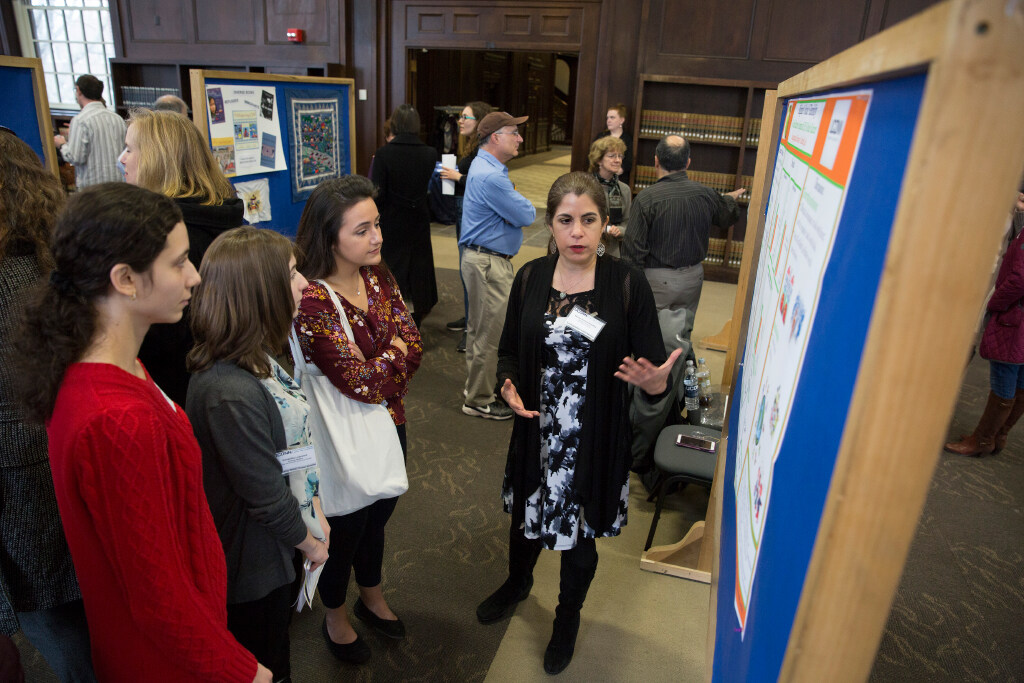
Intergroup Relations Laboratory
PI: Felicia Pratto
The Intergroup Relations Lab at the University of Connecticut focuses on theory and research concerning power, morality, intergroup emotions, social dominance, ideology, group status, inequality, identity, international relations, and political psychology.
Language and Behavior Cultural Lab (LAB-C-Lab)
Language and Behavior Cultural Lab (LAB-C-Lab) answers questions about how culture and language influence personality, behavior, health, and development. In order to answer these questions, we use multiple methodological approaches, including digital recording devices, text analytic tools, and brain measures.
The Sharp Research Lab
PI: Blair Johnson
The Systematic Health Action Research Program (SHARP Lab) is led by UConn Professor Blair T. Johnson. His current research interests encompass these areas, although undergraduate and graduate students' research portfolios are tailored to match both the needs of the students and the lab.
Stigma and Identity Management Lab
PI: Diane Quinn
The Stigma and Identity Management Lab is a team of researchers investigating the consequences of contending with negative group stereotypes. We examine how possessing a stigmatized identity can impact one's career choices, academic performance, and health outcomes.
Perception and Cognition (PAC) & Language and Cognition
Language and cognition studies how humans represent and communicate both the external world and our internal states. Methods include behavioral experiments, neuroimaging, and computational modeling.
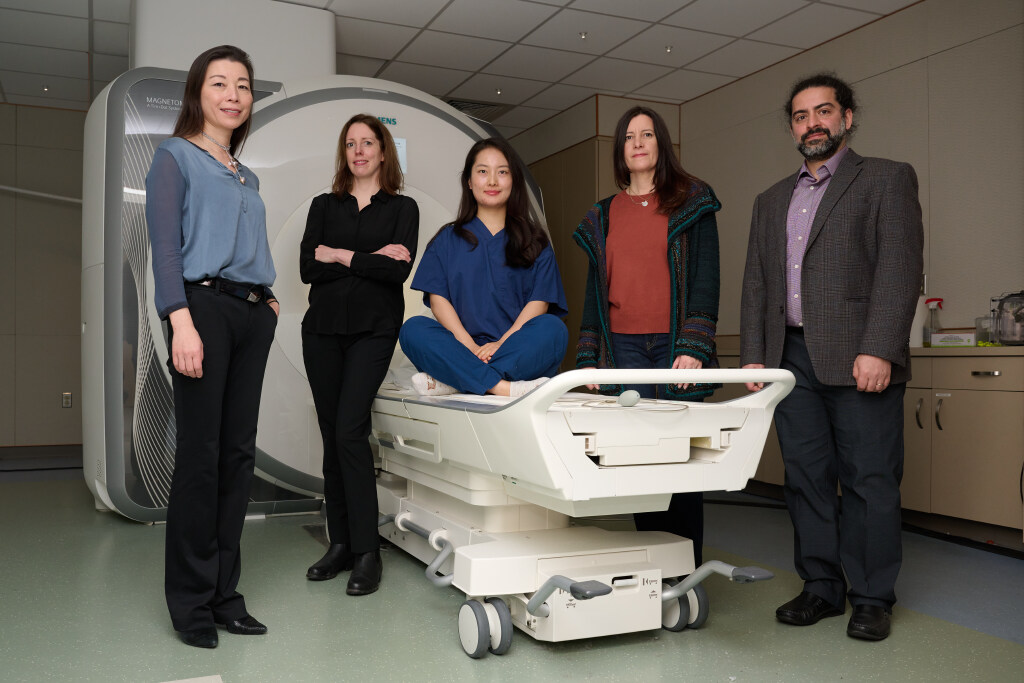
Brain Imaging Research Center
PI: Fumiko Hoeft
The UConn Brain Imaging Research Center (BIRC) opened in June 2015. The BIRC is housed in the David C. Phillips Communication Sciences Building, which underwent significant renovations to accommodate the MRI scanner as well as several research laboratories. The center houses a 3T Siemens Prisma MRI scanner alongside equipment for collecting data with high-density EEG systems, eye tracking, and a transcranial magnetic stimulation (TMS) system.
Psycholinguistics Lab
PI: Gerry Altmann
Solab
PI: Whitney Tabor
Solab stands for “self-organization lab”. It is a lab run by Whit Tabor at the University of Connecticut. Self-organization is a natural phenomenon that occurs in a wide variety of domains. Here is a useful working-characterization.
Yee Lab
PI: Eiling Yee
The Yee Lab is part of the Department of Psychological Sciences' Language and Cognition program which is welcoming applications from prospective PhD students for Fall 2023! Learn more. We also invite all underrepresented students (and former students) who are considering pursuing a PhD in Psychological Sciences, Cognitive Science, Speech and Hearing Sciences, Educational Psychology or Linguistics to check out the MAGIC program! Its mission is to connect underrepresented and first-generation students with mentors who can empower them with the tools to succeed in their graduate school applications and beyond.